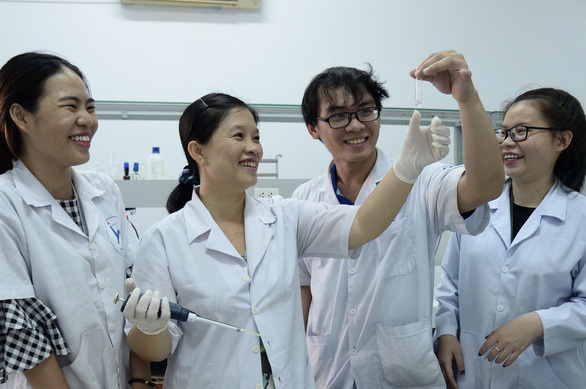 |
|
PhD Phạm Thị Thu Hà (second left) and her students in the laboratory. — Photo tuoitre.vn
|
Hà, who is deputy director of the Institute for Genetics and Breeding under the Tôn Đức Thắng University, successfully create the OM600 rice variety through cross-breeding. The rice variety was recognised as the national variety in 2011 by the Ministry of Agriculture and Rural Development. Hà talks about her work.
Why are you interested in rice varieties?
I’m from a farming family, so everything related to fields and rice has been in my mind since I was small. I love working with rice and learning how to create better rice varieties.
When I visited my hometown as part of a field trip, I was happy to hear local farmers tell each other about several good rice varieties, especially when they spoke about the varieties that I created.
Do you often work outdoors?
Working as scientist, you have to work on the field; transplanting rice seedlings and then analysing and assessing them.
After 10 years, I had practical experience after going to Hiroshima University in Japan to study for my PhD. I understood what I needed to do and did not feel discouraged when coming back to home for research.
In 2014, I went to South Korea to support short-term research about rice.
Which project are you working on after receiving the award?
New rice varieties must grow well in salty conditions, especially now the problem is becoming more and more severe in the Cửu Long (Mekong) Delta.
In addition to rice, we pay attention to other kinds of plants, such as fruits and vegetables. It’s one of my assigned duties when working at the institute.
At present, many kinds of fruits and vegetables in Việt Nam are imported, needing a great amount of money per year. One of the reasons is that local farmers do not have a habit of storing seeds, whereas importing seeds is easier.
Did you face any difficulties in research because you are a female scientist?
When I returned to Việt Nam, I found it difficult when asking for research projects from provinces and organisations. Other young scientists, especially women, also face obstacles. Many organisations do not believe in us, or they only assess our capacity via articles.
In my opinion, we should set up policies to promote female scientists.
Do the difficulties prevent young people from working in the agricultural sector?
In my institute, it’s difficult to find young people with a passion in agricultural research. Few students choose genetics in Việt Nam, only a few study in related sectors, for instance, planting.
One more problem is income. Income from the work is quite low, so many accept jobs that are not suitable with their professions but offer better income.
At university, I always create good conditions for students to take part in research, conferences and agricultural events so that they will have more passion for the work. I have used my own money to help two students go to Thailand and attend an agricultural conference so they can access experts and encourage them to do more research. — VNS
 Dr. Pham Thi Thu Ha is one of three Vietnamese scientists to receive L’Oreal – UNESCO for Women in Science Awards for her achievements and contributions to the community." itemprop="description" />
Dr. Pham Thi Thu Ha is one of three Vietnamese scientists to receive L’Oreal – UNESCO for Women in Science Awards for her achievements and contributions to the community." itemprop="description" />